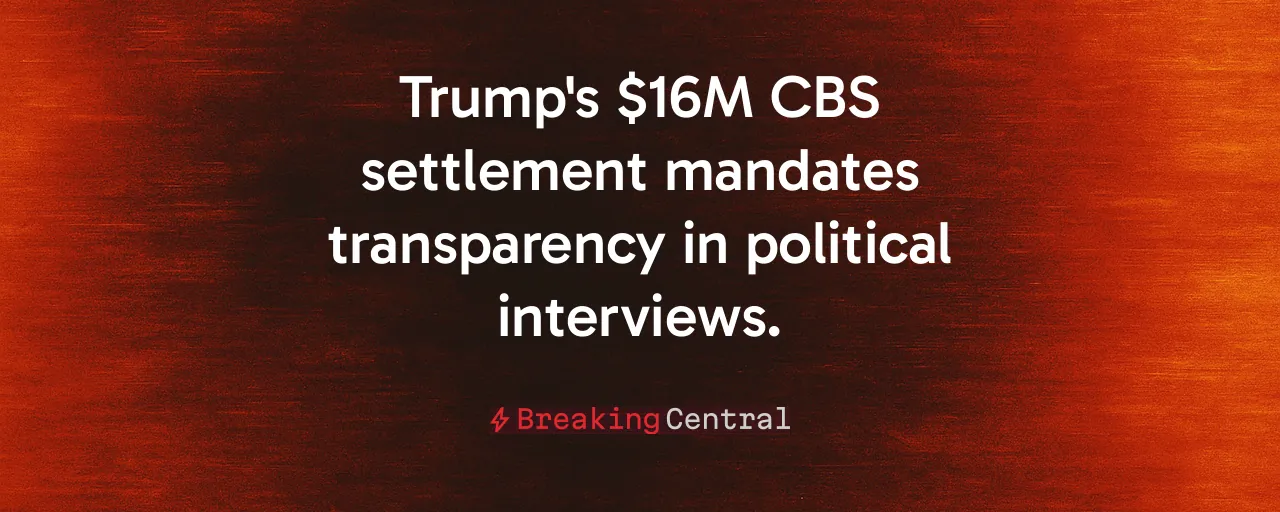A Settlement That Shakes the Media Landscape
President Donald Trump's recent legal victory against Paramount Global, the parent company of CBS News, has sent ripples through the media world. The $16 million settlement, finalized in late July 2025, resolved a lawsuit claiming that CBS's 60 Minutes program deceptively edited an October 2024 interview with then-Vice President Kamala Harris. The case, filed in federal court in Amarillo, Texas, accused the network of manipulating Harris's response on the Israel-Gaza conflict to present her in a more favorable light during her presidential campaign. This outcome marks a pivotal moment, raising urgent questions about trust in political journalism and the integrity of broadcast media.
The settlement requires CBS to pay for Trump's legal fees and direct the remaining funds to his forthcoming presidential library, with no personal financial gain for the president. A critical non-monetary term requires 60 Minutes to release transcripts of future interviews with U.S. presidential candidates, subject only to limited legal or national-security redactions. This provision aims to ensure greater transparency, a demand long echoed by those skeptical of mainstream media's editorial practices. The timing of the deal, coinciding with Paramount's pursuit of an $8 billion merger with Skydance Media, adds a layer of complexity, suggesting corporate priorities may have influenced the outcome.
For many Americans, this case confirms a deep-seated suspicion that powerful media outlets shape narratives to serve political ends. The edited Harris interview, which aired a shorter, more polished version of her response compared to a preview clip on Face the Nation, fueled accusations of deliberate bias. Political commentator Benny Johnson, host of The Benny Show, amplified these concerns, sharing video comparisons and framing the settlement as evidence of 'media fraud.' His coverage resonated with millions, reflecting a broader public frustration with legacy media's role in electoral politics.
Unmasking Editorial Manipulation
At the heart of Trump's lawsuit was a claim that CBS's edits distorted Harris's answer to a question about Israel's actions in Gaza, shielding her from scrutiny. The original preview clip showed a longer, less coherent response, while the 60 Minutes broadcast presented a concise version that appeared to strengthen her position. Supporters of the lawsuit argued this was a deliberate act to bolster Harris's candidacy, exceeding what would be considered a mere time-saving edit. The settlement's requirement for future transcript releases underscores the need to hold broadcasters accountable for such decisions.
This incident is not isolated. Recent history offers examples of media outlets settling high-profile disputes rather than risking prolonged legal battles. In December 2024, ABC News paid Trump $15 million to resolve a defamation claim over unrelated comments, signaling a pattern of corporate expediency. These cases highlight a troubling reality that news divisions, often embedded within sprawling conglomerates, face pressures that can compromise journalistic integrity. Paramount's decision to settle while seeking federal approval for its merger suggests that business interests may override editorial principles.
Public trust in national news has plummeted, with Pew Research Center surveys from 2024 showing confidence levels below 30 percent. The CBS case fuels this skepticism, as viewers question whether edited interviews constitute consumer fraud or even illegal 'in-kind' contributions to political campaigns. Advocates for reform argue that broadcasters, as holders of public airwaves, need to prioritize fairness over partisan agendas, especially when shaping voter perceptions during elections.
A Call for Restored Fairness
The CBS settlement strengthens the case for policies that ensure transparency in political journalism. One proposal gaining traction is a modernized Fairness Doctrine, which would require broadcasters to present balanced perspectives on contentious issues. While the original doctrine, repealed in 1987, faced criticism for stifling free speech, a revised version could focus on disclosure, moving beyond content mandates. For instance, requiring unedited transcripts or raw footage within days of a broadcast could empower viewers to judge edits for themselves.
Another approach involves tying broadcast license renewals to clear transparency standards. The Federal Communications Commission, which oversees these licenses, could incentivize networks to adopt voluntary guidelines, such as publishing raw interview materials. Such measures would align with the public's right to access unfiltered information, particularly when media outlets wield significant influence over electoral outcomes. These reforms aim to restore confidence without infringing on First Amendment protections.
Historical clashes between presidents and the press, from Nixon's feud with the Washington Post to Trump's earlier suits against CNN and The New York Times, show that tensions over media bias are not new. The Paramount case stands out for its tangible outcome: a multimillion-dollar payout and a precedent-setting transparency rule. This victory emboldens those who seek to challenge perceived partisan editing through legal and regulatory means, including state consumer-protection laws that could redefine deceptive practices in journalism.
Safeguarding Journalism's Future
The CBS settlement is a wake-up call for media companies to prioritize integrity, setting it above expediency. By agreeing to pay $16 million and alter its practices, Paramount has acknowledged the stakes of public trust. The broader challenge involves balancing corporate interests with the newsroom's duty to inform. Establishing independent editorial boards or ombudsman panels could insulate journalists from parent-company pressures, ensuring that merger talks or regulatory hurdles do not dictate coverage.
For viewers, the path forward lies in media literacy. Encouraging audiences to compare raw interviews with edited broadcasts fosters critical thinking and reduces reliance on curated narratives. Bipartisan support exists for such initiatives, as both sides recognize the value of an informed electorate. These efforts, combined with voluntary transparency standards, could rebuild confidence in political journalism without resorting to heavy-handed regulation.
The Trump-CBS dispute will not be the last battle over media accountability. As conglomerates consolidate and political polarization deepens, newsrooms need to navigate a landscape where every edit is scrutinized. By embracing openness and fairness, broadcasters can honor their role as stewards of public discourse, ensuring that journalism serves the truth, independent of any single agenda.
